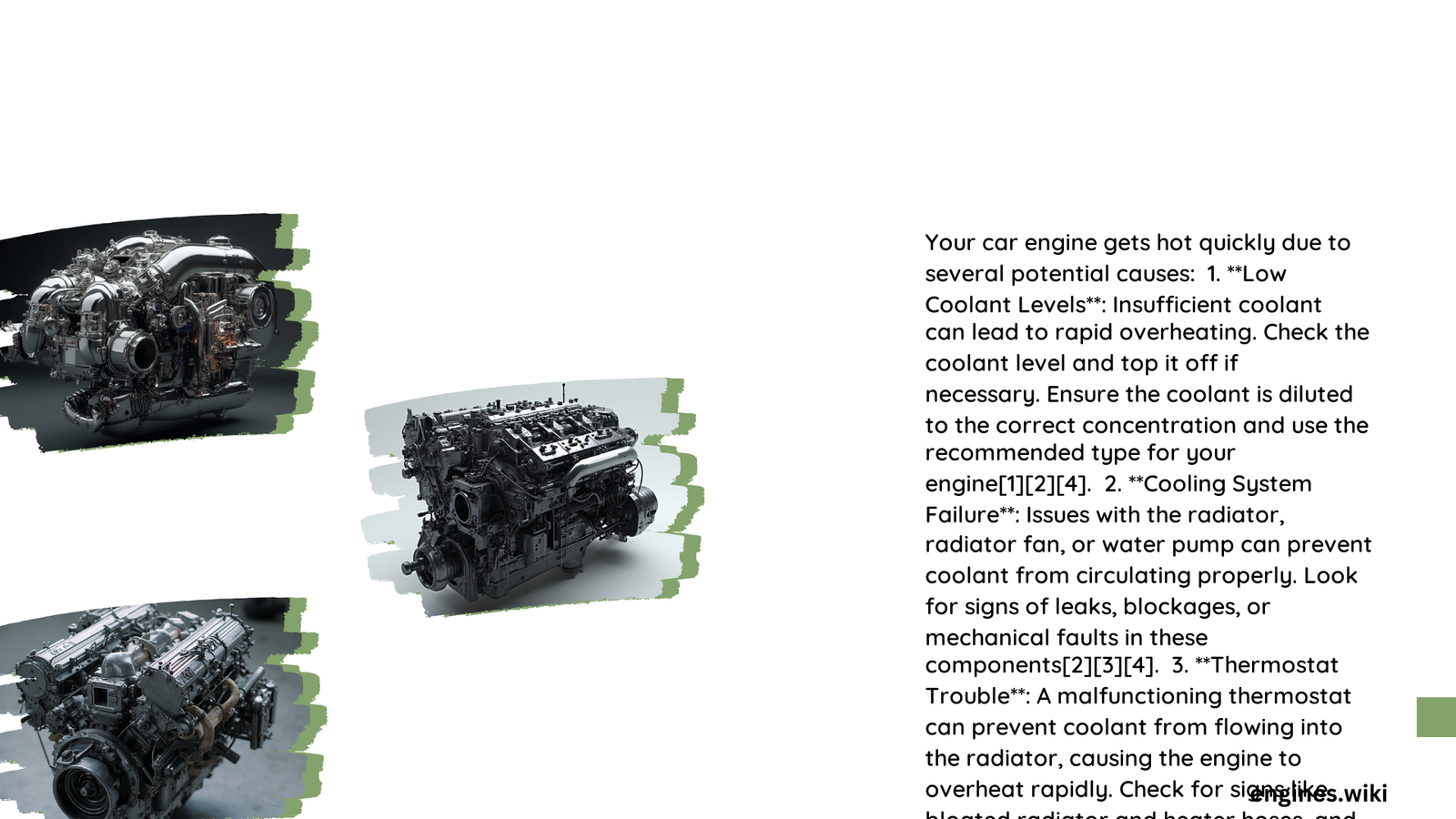An engine that overheats rapidly can lead to severe damage and costly repairs. This issue often stems from cooling system problems, such as coolant leaks, faulty thermostats, or radiator issues. Understanding the causes, recognizing the symptoms, and knowing how to address the problem can help prevent engine damage and ensure your vehicle’s longevity.
Why Does My Car Engine Get Hot Quickly?
The rapid heating of your car’s engine can be attributed to several factors:
- Coolant leaks
- Faulty thermostat
- Damaged radiator
- Malfunctioning cooling fans
- Failed water pump
- Low oil levels
Each of these issues can cause your engine temperature to rise quickly, potentially leading to overheating and damage.
What Are the Signs of a Rapidly Heating Engine?

Recognizing the symptoms of an engine that’s heating up too fast is crucial for preventing severe damage. Look out for:
- Dashboard warning light or temperature gauge showing high temperatures
- Burning smell or sweet coolant odor
- Steam coming from under the hood
- Coolant pooling on the ground
- Unusually hot hood
- Reduced engine power
If you notice any of these signs, it’s essential to take immediate action to prevent further damage to your engine.
How Can I Diagnose the Cause of My Engine Overheating?
To determine why your car engine gets hot quickly, follow these diagnostic steps:
- Check coolant levels
- Inspect for visible leaks
- Examine the radiator for damage or blockages
- Test the thermostat functionality
- Verify cooling fan operation
- Assess the water pump
Coolant Level Check
- Ensure the engine is cool
- Locate the coolant reservoir
- Check if the coolant level is between the ‘MIN’ and ‘MAX’ lines
- If low, add the appropriate coolant mixture
Leak Inspection
Look for:
– Puddles under the car
– Wet spots on hoses or around the radiator
– White exhaust smoke (possible internal leak)
What Role Does the Thermostat Play in Engine Temperature?
The thermostat is a crucial component in regulating engine temperature. A malfunctioning thermostat can cause your engine to overheat rapidly.
Thermostat Functionality Test
- Start the engine and let it idle
- Feel the upper radiator hose
- If it doesn’t warm up after a few minutes, the thermostat may be stuck open
- If it gets very hot very quickly, the thermostat may be stuck closed
How Does Radiator Health Affect Engine Temperature?
A properly functioning radiator is essential for maintaining optimal engine temperature. Issues with the radiator can lead to rapid engine heating.
Radiator Inspection Checklist
- Check for visible damage or leaks
- Look for corrosion or debris blocking airflow
- Ensure the radiator cap is in good condition
- Verify coolant flow through the radiator
What Preventive Measures Can I Take to Avoid Engine Overheating?
To prevent your car engine from getting hot quickly, consider these maintenance tips:
- Regular coolant flushes and replacements
- Routine inspections of hoses and belts
- Keeping the radiator clean and free of debris
- Addressing any leaks promptly
- Maintaining proper oil levels
| Maintenance Task | Frequency |
|---|---|
| Coolant Flush | Every 30,000 miles or 2 years |
| Hose Inspection | Every 3,000 miles or 3 months |
| Radiator Cleaning | Annually |
| Oil Level Check | Monthly |
When Should I Seek Professional Help for My Overheating Engine?
If you’ve performed basic checks and your engine continues to heat up quickly, it’s time to consult a professional mechanic. Seek help immediately if:
- You notice steam coming from under the hood
- The temperature gauge is in the red zone
- You smell burning oil or coolant
- There’s a significant loss of engine power
Remember, addressing overheating issues promptly can prevent costly engine damage and ensure your vehicle’s longevity.
